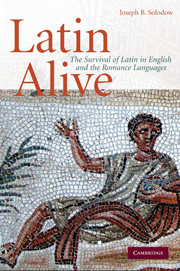Book contents
- Frontmatter
- Contents
- List of Maps
- Acknowledgments
- 1 Introduction
- PART ONE LATIN
- PART TWO THE ROMANCE VOCABULARY
- 7 The Lexicon in General; Shifts in the Meaning of Words
- 8 Changes in the Form of Words
- 9 When Words Collide
- 10 Immigrants
- PART THREE PROTO-ROMANCE, OR WHAT THE LANGUAGES SHARE
- PART FOUR EARLIEST TEXTS AND FUTURE DIRECTIONS, OR WHERE THE LANGUAGES DIVERGE
- Suggestions for Further Reading
- General Index
- Index of English Words
9 - When Words Collide
Conflict and Resolution in the Lexicon
Published online by Cambridge University Press: 05 June 2012
- Frontmatter
- Contents
- List of Maps
- Acknowledgments
- 1 Introduction
- PART ONE LATIN
- PART TWO THE ROMANCE VOCABULARY
- 7 The Lexicon in General; Shifts in the Meaning of Words
- 8 Changes in the Form of Words
- 9 When Words Collide
- 10 Immigrants
- PART THREE PROTO-ROMANCE, OR WHAT THE LANGUAGES SHARE
- PART FOUR EARLIEST TEXTS AND FUTURE DIRECTIONS, OR WHERE THE LANGUAGES DIVERGE
- Suggestions for Further Reading
- General Index
- Index of English Words
Summary
Though much of Latin's vocabulary has continued into the Romance languages, many common Latin words have disappeared, as we saw, and their places have sometimes been taken by other words, sometimes by different forms of the same one. In the modern languages, ignem, for instance, has been replaced by focum as the term for “fire,” iecur by ficatum for “liver,” domum by casam or mansionem for “house.” Hibernum has come to be used for “winter” instead of hiemem, cantare for “to sing” instead of canere, auriculam for “ear” instead of aurem. Some reasons have already been suggested for these preferences. Yet the question deserves further and more systematic consideration if we want, not merely to accept that vocabulary is always in flux, even more than other features of language are, but to understand how and why this is so.
VICTORIOUS CAUSES
In outline, every story of words in conflict is the same. At a given time in the history of the language it happens that more than one word is available to express a certain notion – both ignem and focum, for instance, or both aurem and auriculam. It does not matter whether the two terms are exact synonyms (they never really are) or just loosely associated with each other, nor whether one or the other is well established in the language or but newly coined. Regardless of history or semantics, the two words have at a certain point come to be regarded as equivalent.
- Type
- Chapter
- Information
- Latin AliveThe Survival of Latin in English and the Romance Languages, pp. 158 - 180Publisher: Cambridge University PressPrint publication year: 2010



